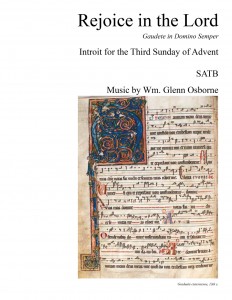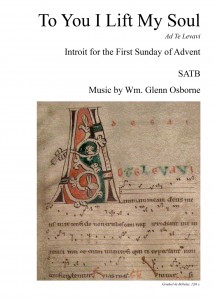Written for SATB Choir, unaccompanied, this piece is a setting of and Advent text by John Dalles based upon Mark 13:33-37. It will be premiered at the 2014 Christmas with the Basilica Choir Concert. Scores will be available for purchase after the premier.
Tag Archives: Unaccompanied
Basilica Choir Christmas CD
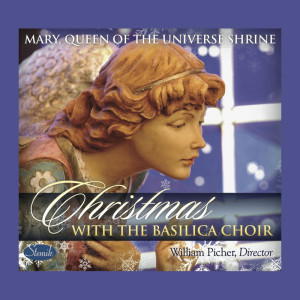 The CD is here! Order yours now for delivery before Christmas!
The CD is here! Order yours now for delivery before Christmas!
The Basilica Choir sings Christmas favorites and new carols on their newest CD on Stemik records including God, We Would Hear the Angels Sing.
Now available on iTunes as well.
The complete list of music follows:
- Joy to the World (Isaac Watts/Lowell Mason, after Handel, arr. William Picher)
- Hodie Christus Natus Est (Giovanni Pierluigi da Palestrina)
- Joseph Lieber, Joseph Mine (Michael Praetorius)
- It Came Upon the Midnight Clear (Edmund Sears/R.S. Willis, arr. William Picher)
- Blessed Be That Maid Marie (Trad. English 17th C., arr. Charles Wood)
- Rejoice in the Lord Always (Anon 16th C.)
- Gaudete (Anon. 16th c, arr. Brian Kay)
- God Rest You Merry, Gentlemen (Trad. English, 17th C., arr. William Picher)
- O Magnum Mysterium (Tomas Luis de Victoria)
- Ave Maris Stella (Trad. Russian, arr. Pavel Chesnokov, adapt. William Picher)
Morris Hudson, guest baritone soloist - Ding Dong Merrily on High (G.R. Woodward, arr. Carolyn Jennings)
- Es ist ein Ros (Michael Praetorius)
- God, We Would Hear the Angels Sing (John A. Dalles/Wm. Glenn Osborne)
- What Child is This (Trad. English, arr. John Stainer)
- The Boar
Cantate Domino
Written by request for the choral concert given on May 22, 2011 by William Picher and the Basilica Choir with friends. The choral group for the day contained 16 singers, and Bill was looking for a 16-voice piece. I sat with this request for quite a while before finally settling on this text and the general style of the piece. Most of the piece is written for 8-part choir, but the middle section is a 16-part fugue. The recording below was made at the dress rehearsal prior to the concert.
Psalm 96: 1-3
Cantate Domino canticum novum:
Cantate Domino omnis terra.
Cantate Domino, benedicite nomini eius:
Adnuntiate diem de die salutare eius.
Purchase of the PDF download includes permission to reprint copies as necessary for performance.
A Cappella Magic
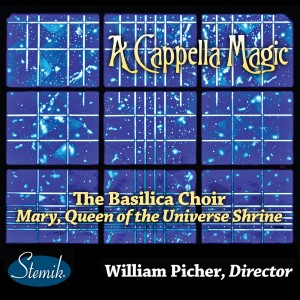 This recording by the Basilica Choir and William Picher includes my composition Salve Regina. The piece was written specifically for them, and I was delighted that they chose to include it on their recording.
This recording by the Basilica Choir and William Picher includes my composition Salve Regina. The piece was written specifically for them, and I was delighted that they chose to include it on their recording.
The CD is available for sale for $15 plus shipping and handling. It is also available at iTunes for immediate download here. This is the complete track list:
- Haec Dies (William Byrd)
- O Bone Jesu (Giovanni Pierluigi da Palestrina)
- Verbum Caro Factus Est (Hans Leo Hassler)
- Alma Redemptoris Mater (Palestrina)
- Regina Caeli Laetare (Antonio Lotti)
- Riu, Riu, Chiu (Anon. Spanish)
- Exsultate Deo (Palestrina)
- I See His Blood Upon the Rose (Michael Bedford)
- At the Cross Her Station Keeping (13th cent., arr. Richard Proulx)
- Were You There? (Spiritual, arr. Harry T. Burleigh)
- Gabriel’s Message (Basque Carol, arr. Jonathan Rathbone)
- Ave Maria (Marshall Webb)
- Set Me As a Seal (René Clausen)
- Tota Pulchra Es (Maurice Duruflé)
- Hail Mary (William Picher)
- Hail Holy Queen (Salve Regina, arr. Derric Johnson)
- I Saw Three Ships (English Carol, arr. Marshall Webb)
- Salve Regina
- Deep River (Spiritual, arr. Norman Luboff)
- Ain’t-a that Good News (Spiritual, arr. William Dawson)
Salvator Mundi
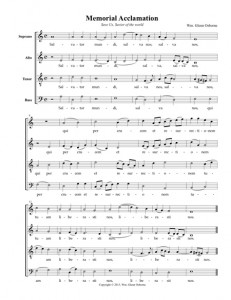 One of the difficulties in using a historical musical setting of the Latin Mass in the Novus Ordo is the lack of Memorial Acclamation and Amen. With only two syllables, it’s usually pretty easy to do some text replacement and derive an Amen from material in other movements. It may even be possible to simply use the amen found at the end of the Gloria or Credo as a stand alone Eucharistic acclamation. The Memorial Acclamation, regardless of the text option chosen, proves a much tougher challenge.
One of the difficulties in using a historical musical setting of the Latin Mass in the Novus Ordo is the lack of Memorial Acclamation and Amen. With only two syllables, it’s usually pretty easy to do some text replacement and derive an Amen from material in other movements. It may even be possible to simply use the amen found at the end of the Gloria or Credo as a stand alone Eucharistic acclamation. The Memorial Acclamation, regardless of the text option chosen, proves a much tougher challenge.
For the Choral Mass on February 22, 2013, at the Basilica of the National Shrine of Mary, Queen of the Universe, Dr. William Picher gave me the task of creating something for him to use alongside Palestrina’s Missa Papae Marcelli. While I initially wrote something for the SATTBB voicing that Palestrina uses, I forgot that this was to be a Latin Mass and set the English response “Save Us, Savior of the World.” Mea culpa. As six contrapuntal voices seemed a bit of a stretch for me in the limited time I had to prepare the piece, when I started over again with the equivalent Latin text, I opted for the more traditional (and perhaps more useful) SATB voicing.
I hope to have a recording of live singers performing the piece after February 22. In the meantime, the music notation program Finale has provided this rendering:
Salvator mundi, salva nos, qui per crucem et resurrectionem tuam liberasti nos.
Lord, by your cross and resurrection you have set us free. You are the Savior of the world.
Ave Verum Corpus
Ave verum corpus,
natum de Maria Virgine,
vere passum, immolatum
in cruce pro homine,
cuius latus perforatum
fluxit aqua et sanguine:
esto nobis praegustatum
in mortis examine.
This setting of the traditional Latin text is for unaccompanied SATB choir with moderate divisi in all four parts. The musical language is modern while still using traditional sonorities. The audio below was generated by the Finale music notation program.
Rejoice in the Lord
Gaudete in Domino semper:
iterum dico, gaudete.
Rejoice in the Lord always,
and again I say rejoice.
This musical setting of text from the introit for the third Sunday of Advent is written for unaccompanied SATB choir. The lyrics use both Latin and English phrases from the introit. The music alternates between short unison chant sections and longer polyphonic sections based on ideas found in the original Gregorian chant.
To You I Lift My Soul
Ad te levavi animam meam:
Deus meus in te confido.
Non erubescam.
To You, I lift up my soul.
I trust in you.
This musical setting of text from the introit for the first Sunday of Advent is written for unaccompanied SATB choir. The lyrics use both Latin and English phrases from the introit. The music alternates between short unison chant sections and longer polyphonic sections based on ideas found in the original Gregorian chant.
Regina Caeli
Regina caeli laetare, Alleluia,
Quia quem meruisti portare. Alleluia,
Resurrexit sicut dixit, Alleluia.
Ora pro nobis Deum. Alleluia.
Intended for use during the Easter Season, this is the second Marian antiphon I set for SSAATTBB choir. The traditional chant melody is cast in a modern tonal language. A piano reduction of the SSAATTBB piece provided in the score for rehearsals. The audio below was generated by the Finale music notation program.
God, We Would Hear the Angels Sing
 A Christmas carol for unaccompanied SATB choir. Lyrics by John Dalles. The piece is included on the recording “Christmas with the Basilica Choir.” and is also available on iTunes and may be heard on Spotify.
A Christmas carol for unaccompanied SATB choir. Lyrics by John Dalles. The piece is included on the recording “Christmas with the Basilica Choir.” and is also available on iTunes and may be heard on Spotify.

